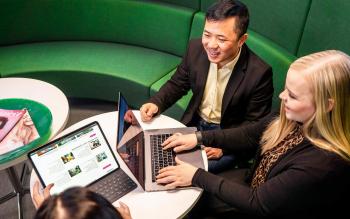

It’s not uncommon for Haaga-Helia students to get going with their studies so enthusiastically that original plans – even one’s career – take a whole new direction. This also happened to Jay Bhavsar.

- I was checking up online courses to suite my interest in AI related topics, says Bhavsar, who works as a Senior Manager for HMD Global.
- Haaga-Helia immediately stood out with their syllabus, since it’s specifically designed for people studying alongside work – courses take place at evenings and during the weekends. So instead of taking up individual courses I’m completing a Master’s degree in Business Technologies, specialising in Digital Business Opportunities.
Digital Business Opportunities specialisation prepares students to identify and utilise business opportunities offered by new digital technologies. The specialisation provides the student with generic technology knowledge which can be applied widely in any industry and business or in the public sector.
- I found the studying methods at Haaga-Helia most effective, says Jay Bhavsar.
- From day one, our professor Jouni Soitinaho was gently pushing us to come up with a topic for our thesis that could be implemented into our own line of business.
Bhavsar also gives thanks to all teachers and personnel at Haaga-Helia for being able to adapt and modify ways of studying during the COVID 19 pandemic.
- Ironically, the pandemic enabled me to study even more efficiently, since I needed not, for example, travel for work.
Jay Bhavsar has indeed travelled a lot for work to, for example, execute quality check-ups at factories producing mobile devices, ramping up after sales business, and checking different repair partners globally. This, alongside with discussions he’s had with his co-workers and -students, led him to his thesis topic.
- I’ve witnessed masses of electronic residue coming to existence while these devices are being manufactured and also during repairs, says Bhavsar.
- So I started to do research on how these particles could be re-used and the amount of electronic waste reduced to a minimum. I call it harvesting.”
Based on this research and harvesting, Bhavsar and his colleagues have developed a Process to meet the requirements of sustainability and provide access to environment certificates such as the ISO 14001. While improving the image of any company or organisation, this Circular economy innovation will naturally result in smaller production costs. Not to mention the environmental benefits.
- I’ve got all the data, all I need to do now is to sit down and write my thesis, Jay Bhavsar gives a laugh.
- But seriously and more pervasively speaking, I’m hoping we will all have less or zero electronic waste filling our drawers in the near future.